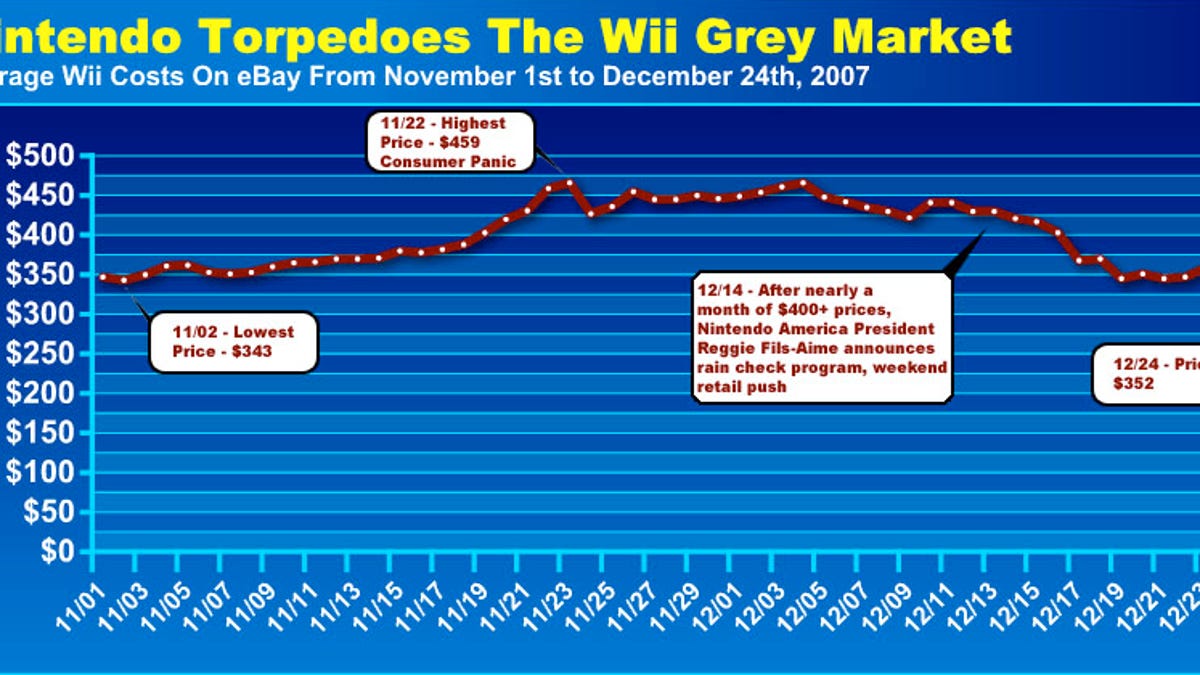How Nintendo kept eBay Wii prices in check
Despite severe shortages of the in-demand video game console, prices on the online auction site never got too high thanks to clever maneuvers by Nintendo.

If you were trying to find a Nintendo Wii to give someone as a Christmas present and were counting on buying that Wii at a retailer like Best Buy or Target, odds are you came away empty-handed and frustrated.
That was certainly my experience when I spent a day looking to see where it might be possible to find a Wii near San Francisco.
But always, in the back of my mind, I figured that for those who were truly desperate to get ahold of one of the machines, a small mint would fetch one on eBay.
I remember, however, thinking that it was odd that, on the one time I looked to see what Wiis were selling for on eBay, they weren't that expensive. One could be had for between $300 and $400, which, while substantially higher than the $250 sticker price, wasn't all that much given the intense consumer hunger for them.
What didn't occur to me at the time was that Nintendo seems to have been actively trying to manage the eBay price of Wiis. That at least seems to be what was going on, according to a report on the video game blog Kotaku on Monday.
Titled "Nintendo torpedoes the Wii grey market," the Kotaku story details the Wii environment during the holiday period and also points out that the console was actually hard to find throughout 2007, not just before Christmas.
But for sure, it was the holiday rush that put the most scrutiny on the Wii's unavailability and the thought that those selling the consoles on eBay would be earning small fortunes, with plenty of news stories stoking the fires.
"Rumors of chip shortages ran rampant, and I personally was certain that the eBay grey market price for the (Wii) would...meet if not surpass the highest numbers seen during the initial late 2006 release window," Mike Fahey wrote on Kotaku. "Miraculously, that never happened. At the very last moment, in a series of moves that gained them criticism from fans, Nintendo managed to pull together enough supply to curb the often ridiculously inflated eBay demand before it was too late."
To be sure, Wiis were selling for more than $100 over retail on eBay and eventually spiked at $459 on November 21, according to the Kotaku report. But given that hot products sometimes sell for hundreds and hundreds more than sticker, this wasn't too bad.
But then Nintendo got involved and the prices dropped. On December 14, Nintendo held a conference call for reporters in which it talked about its plans for handling holiday demand for the Wii. It discussed many different options, including a rain-check system (which I discussed in my story about looking for Wiis), as well as new stock that would be available at a series of retailers.
And while the rain-checks wouldn't result in actual Wiis in hands until January and the retailers got limited shipments that quickly ran out, the moves, along with the outreach to video game journalists, seemed to have worked in creating a public impression that the consoles were at least marginally available and therefore it maybe wasn't necessary for consumers to pay a year's college tuition to get a Wii on eBay.
That's particularly true because the flood of consoles that hit retailers seemed to have quickly put a damper on eBay prices as many people apparently tried to make a killing there. The result was a huge number of Wiis offered for sale on eBay around December 17, and an average price for the consoles dropping below $400.
It's an interesting dynamic, especially when you consider that Wiis have been around for more than a year. And it's particularly interesting that, whether intended or not, Nintendo's actions can be tied directly to the significant dropping of prices for the consoles on eBay.
Whether this is a model that other manufacturers will follow in months or years to come remains to be seen.

